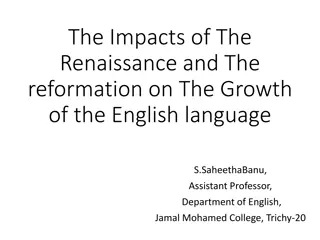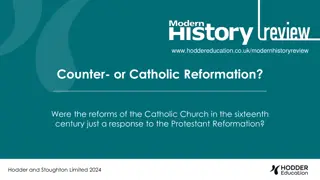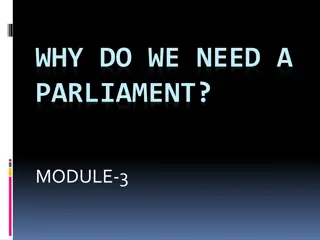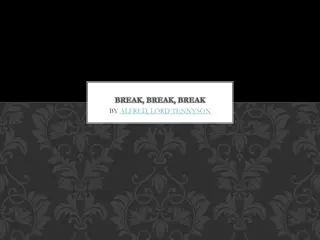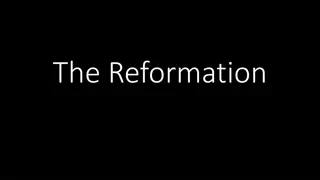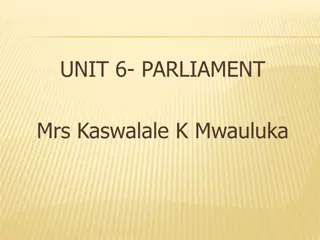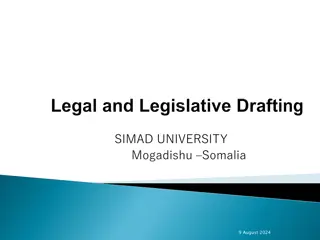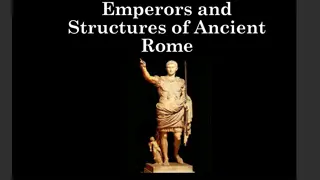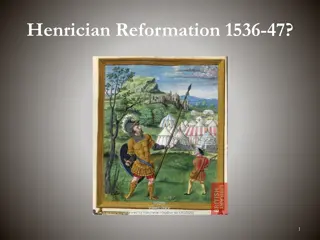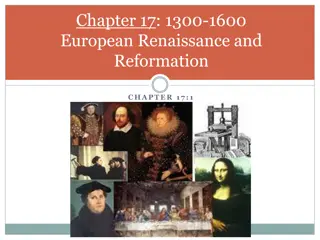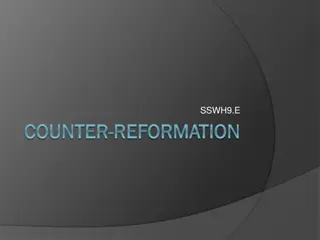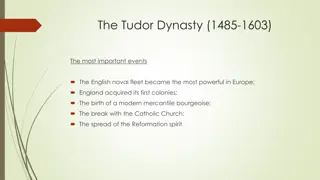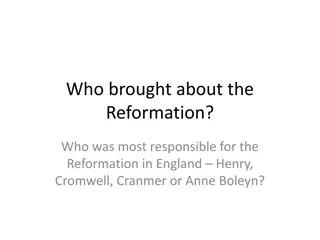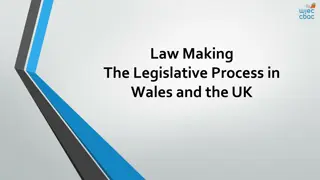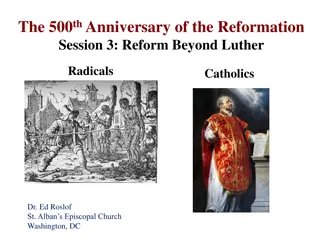The Reformation Parliament and the Break with Rome
The Reformation Parliament played a crucial role in enforcing the break with Rome through various key statutes, such as the Act in Restraint of Appeals in 1533. This pivotal legislation not only granted Henry VIII the power to decide marriage cases within the realm but also made a radical statement asserting the supremacy of the English monarch and the idea that England is an empire. The parliament enacted a total of 137 statutes, with 32 being of significant national importance.
Download Presentation

Please find below an Image/Link to download the presentation.
The content on the website is provided AS IS for your information and personal use only. It may not be sold, licensed, or shared on other websites without obtaining consent from the author.If you encounter any issues during the download, it is possible that the publisher has removed the file from their server.
You are allowed to download the files provided on this website for personal or commercial use, subject to the condition that they are used lawfully. All files are the property of their respective owners.
The content on the website is provided AS IS for your information and personal use only. It may not be sold, licensed, or shared on other websites without obtaining consent from the author.
E N D
Presentation Transcript
WHEN Individual test, without consulting your notes, put the following in the right order first and then try to give the dates to the month and year you have 6 minutes . A. Act in Conditional Restraint of Annates B. Supplication against the Ordinaries C. Clergy pardoned of praemunire charge D. The submission of the Clergy E. Archbishop Warham dies F. Collectanea presented to Henry G. Catherine s appearance at Blackfriars H. Clergy as a whole accused of praemunire I. Fall (not death) of Wolsey
Answer GIFHCBDAE Catherine s appearance at Blackfriars (June, 21st1529) G Fall (not death) of Wolsey (October 1529) I Collectanea presented to Henry (September 1530) F Clergy as a whole accused of praemunire (December 1530) H Clergy pardoned of praemunire charge (February 1531) C Act in Conditional Restraint of Annates (Jan-March, 1532) B Supplication against the Ordinaries (March 1532) D The submission of the clergy (May 15th 1532) A (n.b. mistake in my timeline!) Archbishop Warham dies (August 22nd, 1532) E
The Final Phase in the Kings Great Matter The Reformation Parliament enforces the break with Rome through statute.
The last phase involved the actual break with Rome. This was done through parliamentary statute. The so-called Reformation parliament met for seven years It enacted 137 statutes, 32 of which were of vital national importance.
Types of law Statute - highest form of law Ordinance Decree Injunction Proclamation G.W. Bernard identifies 6 different purposes of the Reformation statutes Read through the selected statutes and try to work out what these could be N.b. getting Henry what he wanted (the annulment, the marriage and securing the succession) is only one of the six...
1533 Act in Restraint of Appeals This is perhaps the key piece of legislation. At one level it simply gives Henry what he needs it cuts dead Catherine s attempts to have the pope decide on the marriage case. Henry can now have it decided within the realm. However, at another level it goes well beyond this. The really important section is not the main body but the preamble which provides the first statement in law of the idea that this realm of England is an empire and the idea that the king s authority within that realm is supreme. Preamble is a radical statement of caesaro-papism. England is an empire and therefore no power above or beyond. Makes a GLOBAL case much stronger than Praemunire, no longer ad hoc. All statute law is based on the pretence that it is restatement what has been the custom. All other pieces of legislation are basically tidying up the principles of the Act in Restraint of Appeals.
Tidying up legislation 1534 Second Act of Annates confirms the first and makes the appointment of bishops the role of the king. 1534 Dispensations Act stops payment of Peter s Pence to Rome and any other payments; the bishop of Rome s power to give dispensations in England is revoked. 1534 Act of the submission of the Clergy ultimate court of appeal is no longer archbishop but King s Court of Chancery.
1534 Act of Succession 1534 First Act of Succession (ever) This disinherited Mary, and made Anne Boleyn s child (expected son) the heir to the throne. Required an oath from all adults aged 14 and above. Thomas More and John Fisher refused to take the oath because it meant accepting the nullification of the previous marriage and the means by which this was achieved. Later, both offered to take a modified oath to accept the Act of Succession and the king s marriage, but not the break with Rome. Henry refused.
1534 November- Act of Supremacy This did NOT make Henry Supreme Head of the church in England, it merely RECOGNISED tht this was and had always been thus but in addition: It was designed to catch religious houses, all of whom have strong links abroad esp. observant Franciscans tidying up measure to ensure that all religious houses now owed obedience to the king rather than to mother houses abroad or to the bishop of Rome. It also granted visitation rights were given to the Crown this is going to be important later.
Treason Act December 1534 The Act specified that all those were guilty of high treason who: do maliciously wish, will or desire by words or writing, or by craft imagine, invent, practise, or attempt any bodily harm to be done or committed to the king's most royal person, the queen's or the heirs apparent [Elizabeth], or to deprive them of any of their dignity, title or name of their royal estates, or slanderously and maliciously publish and pronounce, by express writing or words, that the king should be heretic, schismatic, tyrant, infidel or usurper of the crown... The word 'maliciously' was added in several cases to require evil intent, and the Act meant that it was very dangerous to say anything against what the King had done.
Treason Act 1534 - Treason Act (see Elton, Policy and Police) aimed at ordinary people. Makes it explicit that Treason can take the form of words and not just deeds (This will catch Henry Howard later on, exec. In 1546 talking about how important the Howards are going to be after H s death). The 1534 Act made it treason, punishable by death, to disavow the Act of Supremacy. Sir Thomas More was arrested for refusing to take the oath of succession and executed under the Treason Act for denying supremacy. It was introduced as a blanket law in order to deal with the minority of cases who would refuse to accept Cromwell's and Henry's changes in policies, instead of using the more traditional method of attainders.
The end of the final phase in the Kings Great Matter 1534 December - Act of First Fruits and Tenths tidying up taxes go to King not the pope. Also made new tax an additional and valuable source of revenue. 1536 Thomas Cromwell was made Vicegerant in the Spirituals so that he ran the church on Henry s behalf. 1536 Act for the Dissolution of the Smaller Monasteries (a big question here is Henry s motivation was it political, material, religious or all 3? Which was primary?) 1536 Act to Extinguish the power of the bishop of Rome coming after the execution of Anne Boleyn, Henry s determination to secure Royal Supremacy by 1536 went far beyond simply getting a divorce.


